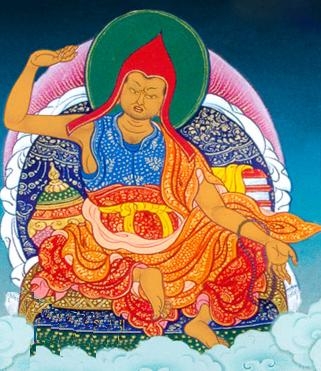Aryadeva: Difference between revisions
No edit summary |
mNo edit summary |
||
| (18 intermediate revisions by 3 users not shown) | |||
| Line 1: | Line 1: | ||
[[Image:Aryadeva.JPG|frame|Aryadeva]] | |||
'''Aryadeva''' (Skt. ''Āryadeva''; Tib. [[འཕགས་པ་ལྷ་]], ''Pakpa Lha'', [[Wyl.]] ''‘phags pa lha'') (second/third century) — one of the six great commentators (the ‘[[Six Ornaments]]’) on the [[Buddha]]'s teachings. He was a disciple of [[Nagarjuna]] and devoted his life to continuing his master’s work, consolidating the [[Madhyamika]] tradition. He is also counted among the [[eighty-four mahasiddhas]]. | |||
==Writings== | |||
*''[[Four Hundred Verses]]'' | |||
*''Lamp that Integrates the Practices'' (Skt. ''Caryāmelāpaka-pradīpa''; Tib. སྤྱོད་པ་བསྡུས་པའི་སྒྲོན་མ་, [[Wyl.]] ''spyod pa bsdus pa'i sgron ma''), a treatise on the [[Guhyasamaja Tantra]]. | |||
:{{TBRCW|O00CR0008|O00CR000800CR031427$W23702|སྤྱོད་པ་བསྡུས་པའི་སྒྲོན་མ་, ''spyod pa bsdus pa'i sgron ma''}} | |||
*''Shatashastra'', which only remains in its Chinese translation by Kumārajīva. | |||
==[[Quotations: Indian Masters|Quotations]] from [[Four Hundred Verses]]== | |||
{{:Quotations: Aryadeva, Four Hundred Verses, Entertaining doubts about Samsara will make it fall appart}} | |||
{{:Quotations: Aryadeva, Four Hundred Verses, Turn away from non-virtue}} | |||
{{:Quotations: Aryadeva, Four Hundred Verses, Emptiness of one is everything}} | |||
==Further Reading== | |||
*David Seyfort Ruegg, ''The Literature of the Madhyamaka School of Philosophy in India'', Wiesbaden: Harrassowitz, 1981 | |||
*Lobsang N. Tsonawa, ''Indian Buddhist Pandits from The Jewel Garland of Buddhist History'', Dharamsala: Library of Tibetan Works and Archives, 1985. | |||
*Christian Wedemeyer, ''Vajrayāna & Its Doubles: A Critical Historiography, Exposition, and Translation of the Tantric Works of Āryadeva'', PhD dissertation, Columbia University (New York 1999). | |||
==External Links== | |||
*{{TBRC|P0RK240|TBRC profile}} | |||
[[Category:Historical Masters]] | [[Category:Historical Masters]] | ||
[[Category:Indian Masters]] | |||
[[Category:Seventeen Nalanda Masters]] | [[Category:Seventeen Nalanda Masters]] | ||
Latest revision as of 10:14, 12 February 2021

Aryadeva (Skt. Āryadeva; Tib. འཕགས་པ་ལྷ་, Pakpa Lha, Wyl. ‘phags pa lha) (second/third century) — one of the six great commentators (the ‘Six Ornaments’) on the Buddha's teachings. He was a disciple of Nagarjuna and devoted his life to continuing his master’s work, consolidating the Madhyamika tradition. He is also counted among the eighty-four mahasiddhas.
Writings
- Four Hundred Verses
- Lamp that Integrates the Practices (Skt. Caryāmelāpaka-pradīpa; Tib. སྤྱོད་པ་བསྡུས་པའི་སྒྲོན་མ་, Wyl. spyod pa bsdus pa'i sgron ma), a treatise on the Guhyasamaja Tantra.
- Shatashastra, which only remains in its Chinese translation by Kumārajīva.
Quotations from Four Hundred Verses
ཐེ་ཚོམ་ཟ་བར་ཡང་མི་འགྱུར། །
ཐེ་ཚོམ་ཟ་བར་ཙམ་ཞིག་གིས། །
Those with little merit will not
Even wonder about these things.
But merely to entertain doubts
About samsara will make it fall apart.
- Aryadeva, Four Hundred Verses, VIII, 5
བར་དུ་བདག་ནི་བཟློག་པ་དང༌། །
ཕྱི་ནས་ལྟ་བ་ཀུན་བཟློག་པ། །
At first, turn away from non-virtue,
In the middle, dispel misconceptions of self,
Finally, go beyond all philosophical views—
One who understands this is wise indeed.
- Āryadeva, Four Hundred Verses, VIII, 15
དེ་ནི་ཀུན་གྱི་ལྟ་པོར་བཤད། །
གཅིག་གི་སྟོང་ཉིད་གང་ཡིན་པ། །
Whoever sees the nature of one thing
Is said to see the nature of everything.
For the emptiness of one thing
Is the emptiness of everything.
- Aryadeva, Four Hundred Verses, VIII, 16
Further Reading
- David Seyfort Ruegg, The Literature of the Madhyamaka School of Philosophy in India, Wiesbaden: Harrassowitz, 1981
- Lobsang N. Tsonawa, Indian Buddhist Pandits from The Jewel Garland of Buddhist History, Dharamsala: Library of Tibetan Works and Archives, 1985.
- Christian Wedemeyer, Vajrayāna & Its Doubles: A Critical Historiography, Exposition, and Translation of the Tantric Works of Āryadeva, PhD dissertation, Columbia University (New York 1999).